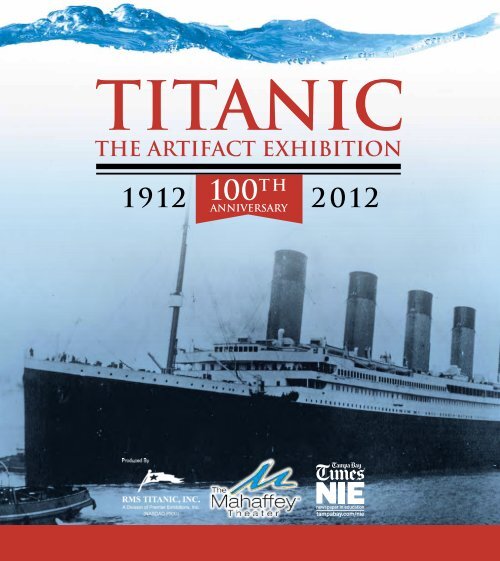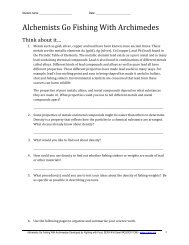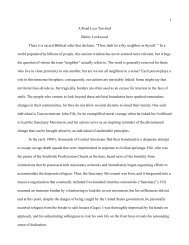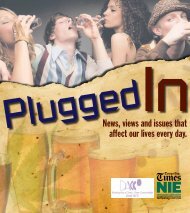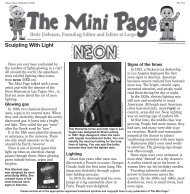to download the publication - Newspapers In Education
to download the publication - Newspapers In Education
to download the publication - Newspapers In Education
You also want an ePaper? Increase the reach of your titles
YUMPU automatically turns print PDFs into web optimized ePapers that Google loves.
Titanic<br />
The Artifact Exhibition<br />
1912 2012<br />
100 th<br />
anniversary
On April 15, 1912, RMS Titanic,<br />
<strong>the</strong> world’s largest ship, sank<br />
after colliding with an iceberg,<br />
claiming more than 1,500 lives<br />
and subsequently altering <strong>the</strong> world’s confidence<br />
in modern technology. One hundred years later,<br />
<strong>the</strong> Mahaffey Theater pays tribute <strong>to</strong> <strong>the</strong> tragedy<br />
which continues <strong>to</strong> resonate through Titanic: The<br />
Artifact Exhibition, where more than 125 legendary<br />
artifacts, conserved from <strong>the</strong> ship’s debris field, are<br />
showcased, offering visi<strong>to</strong>rs a poignant look at this<br />
iconic ship and its passengers.<br />
Running through March 3, 2013, <strong>the</strong> five-month<br />
exhibition features artifacts never before seen in<br />
Tampa Bay.<br />
The exhibition is designed <strong>to</strong> focus on <strong>the</strong> legendary<br />
RMS Titanic’s compelling human s<strong>to</strong>ries as best<br />
<strong>to</strong>ld through au<strong>the</strong>ntic artifacts and extensive room<br />
recreations. Perfume from a maker who was traveling<br />
<strong>to</strong> New York <strong>to</strong> sell his samples, china etched with<br />
Titanic<br />
The Artifact Exhibition<br />
1912 2012<br />
100 th<br />
anniversary<br />
<strong>the</strong> logo of <strong>the</strong> elite White Star Line Oceanic Steam<br />
Navigation Company, even a set of perfectly<br />
preserved au gratin dishes offer haunting,<br />
emotional connections <strong>to</strong> lives abruptly<br />
ended or forever altered.<br />
Visi<strong>to</strong>rs are quickly drawn back in time <strong>to</strong><br />
1912 upon entrance <strong>to</strong> <strong>the</strong> exhibit, as each<br />
visi<strong>to</strong>r receives a replicated boarding pass held<br />
by an actual passenger on board Titanic. Visi<strong>to</strong>rs<br />
<strong>the</strong>n begin <strong>the</strong>ir chronological journey through <strong>the</strong><br />
life of Titanic, moving through <strong>the</strong> ship’s construction,<br />
<strong>to</strong> life on board, <strong>to</strong> <strong>the</strong> ill-fated sinking and amazing<br />
artifact rescue efforts. Guests will marvel at <strong>the</strong> recreated<br />
first-and third-class cabins, and press <strong>the</strong>ir<br />
palms against an iceberg while learning of countless<br />
s<strong>to</strong>ries of heroism and humanity.<br />
Titanic: The Artifact Exhibition allows visi<strong>to</strong>rs <strong>to</strong><br />
conduct personalized explorations of <strong>the</strong> wreck<br />
site utilizing an interactive <strong>to</strong>ol <strong>to</strong> explore pho<strong>to</strong><br />
mosaics of Titanic in her final resting place. The<br />
recent technological advances utilized on Expedition<br />
2010, <strong>the</strong> most recent recovery expedition, have<br />
allowed scientists <strong>to</strong> piece <strong>to</strong>ge<strong>the</strong>r, from thousands<br />
of sequential images, a full picture of Titanic as it lies<br />
<strong>to</strong>day. The interactive device includes components<br />
from <strong>the</strong> Titanic Mapping Project,<br />
showing <strong>the</strong> exact locations of artifacts recovered<br />
from <strong>the</strong> wreck site that had been scattered on<br />
<strong>the</strong> ocean floor; video footage explaining in detail<br />
how Expedition 2010 came <strong>to</strong> fruition and <strong>the</strong><br />
technological breakthroughs that guided <strong>the</strong><br />
expedition.<br />
Over <strong>the</strong> past 15 years, more than 25 million people<br />
have seen this powerful exhibition in major museums<br />
worldwide — from Chicago <strong>to</strong> Los Angeles and from<br />
Paris <strong>to</strong> London. RMS Titanic, <strong>In</strong>c. is <strong>the</strong> only company<br />
permitted by law <strong>to</strong> recover objects from <strong>the</strong> wreck site<br />
of Titanic.<br />
RMS Titanic, <strong>In</strong>c.<br />
RMS Titanic, <strong>In</strong>c., a wholly owned subsidiary of<br />
Premier Exhibitions, <strong>In</strong>c., is <strong>the</strong> only company<br />
permitted by law <strong>to</strong> recover objects from <strong>the</strong><br />
wreck site of Titanic. The company was granted<br />
salvor-in-possession rights <strong>to</strong> <strong>the</strong> wreck site of<br />
Titanic by a United States federal court in 1994,<br />
and has conducted eight research and recovery<br />
expeditions <strong>to</strong> Titanic's debris field, recovering<br />
more than 5,500 artifacts. Premier Exhibitions,<br />
<strong>In</strong>c. is a major provider of museum-quality<br />
<strong>to</strong>uring exhibitions throughout <strong>the</strong> world. For<br />
more information, go <strong>to</strong> RMSTitanic.net.<br />
2 tampabay.com/nie
Learning with <strong>the</strong> Times<br />
His<strong>to</strong>ry in <strong>the</strong> news<br />
On board Titanic<br />
The cost of a first-class ticket <strong>to</strong> New York on Titanic was $2,500,<br />
approximately $57,200 <strong>to</strong>day. The most expensive rooms were more<br />
than $103,000 in <strong>to</strong>day’s currency.<br />
Today’s news is <strong>to</strong>morrow’s his<strong>to</strong>ry. The newspaper<br />
provides us with a chronicle of important daily<br />
events. <strong>In</strong> <strong>the</strong> future, some of <strong>the</strong> events will have<br />
been considered important while o<strong>the</strong>rs will be<br />
considered of little consequence. The his<strong>to</strong>rian<br />
decides what is and is not important. Assume that<br />
you are going <strong>to</strong> write a his<strong>to</strong>ry book about your<br />
community from its beginnings <strong>to</strong> <strong>the</strong> present day.<br />
Examine <strong>the</strong> Tampa Bay Times for a period of one<br />
week. Is <strong>the</strong>re any news about your community<br />
that you are likely <strong>to</strong> include in your his<strong>to</strong>ry book?<br />
Identify <strong>the</strong> s<strong>to</strong>ries and indicate why you would<br />
include <strong>the</strong> information in your book. Since space<br />
in your book will be limited, you must be selective.<br />
Create an outline for <strong>the</strong> contents of your book. You<br />
must include specific quotes and examples from <strong>the</strong><br />
articles <strong>to</strong> show <strong>the</strong>ir importance.<br />
A third-class ticket on Titanic cost $40, which is approximately $900<br />
in <strong>to</strong>day’s currency. Up <strong>to</strong> 10 people resided in third-class rooms. The<br />
rooms were divided by male and female, oftentimes splitting families.<br />
First-class passengers had <strong>the</strong> luxury of paying for <strong>the</strong>ir leisure while<br />
on board: a ticket <strong>to</strong> <strong>the</strong> swimming pool cost 25¢, while a ticket for <strong>the</strong><br />
squash court (as well as <strong>the</strong> services of a professional player) cost 50¢.<br />
Sixty chefs and chefs’ assistants worked in Titanic’s five kitchens.<br />
They ranged from soup and roast cooks <strong>to</strong> pastry chefs and vegetable<br />
cooks. There was a kosher cook, <strong>to</strong>o, <strong>to</strong> prepare meals for Jewish<br />
passengers.<br />
Titanic had its own newspaper, <strong>the</strong> Atlantic Daily Bulletin, prepared<br />
aboard <strong>the</strong> ship. <strong>In</strong> addition <strong>to</strong> news articles and advertisements, it<br />
contained a daily menu, <strong>the</strong> latest s<strong>to</strong>ck prices, horse-racing results<br />
and society gossip.<br />
There were only two bathtubs for <strong>the</strong> more than 700 third-class<br />
passengers on board <strong>the</strong> ship.<br />
The forward part of <strong>the</strong> boat deck was promenade space for firstclass<br />
passengers and <strong>the</strong> rear part for second-class passengers.<br />
Thus, people from <strong>the</strong>se classes had <strong>the</strong> best chance of getting in<strong>to</strong> a<br />
lifeboat simply because <strong>the</strong>y could get <strong>to</strong> <strong>the</strong>m quickly and easily.<br />
“… I jumped out, feet first. I was clear of <strong>the</strong> ship;<br />
went down, and as I came up I was pushed away from<br />
<strong>the</strong> ship by some force. I came up facing <strong>the</strong> ship,<br />
and one of <strong>the</strong> funnels seemed <strong>to</strong> be lifted off and<br />
fell <strong>to</strong>wards me about 15 yards away, with a mass of<br />
sparks and steam coming out of it. I saw <strong>the</strong> ship in a<br />
sort of a red glare, and it seemed <strong>to</strong> me that she broke<br />
in two just in front of <strong>the</strong> third funnel. …The partly<br />
filled lifeboat standing by about 100 yards away never<br />
came back. Why on Earth <strong>the</strong>y never came back is a<br />
mystery. How could any human being fail <strong>to</strong> heed<br />
those cries?”<br />
— Jack B. Thayer,<br />
Titanic survivor, age 17<br />
tampabay.com/nie 3
The maiden<br />
voyage<br />
On April 10, 1912, RMS Titanic embarked on its maiden<br />
voyage, sailing from Southamp<strong>to</strong>n, England, <strong>to</strong> New<br />
York City. Titanic, one of <strong>the</strong> largest and most luxurious<br />
passenger liners at <strong>the</strong> time, also was considered by many<br />
<strong>to</strong> be unsinkable. However, on April 14, <strong>the</strong> ship struck<br />
an iceberg, and early <strong>the</strong> next day it sank. Approximately<br />
1,500 people died. Because of <strong>the</strong> tragedy, Titanic became<br />
perhaps <strong>the</strong> best-known ship in <strong>the</strong> world, capturing <strong>the</strong><br />
public imagination and inspiring popular books and movies.<br />
Source: Encyclopedia Britannica<br />
The plan<br />
The intensely competitive trans-Atlantic<br />
steamship business had seen recent major<br />
advances in ship design, size and speed at<br />
<strong>the</strong> onset of <strong>the</strong> 20th century. White Star<br />
Line, one of <strong>the</strong> leaders, was determined<br />
<strong>to</strong> focus on size and elegance ra<strong>the</strong>r than<br />
pure speed. <strong>In</strong> 1907, White Star Line’s<br />
managing direc<strong>to</strong>r, J. Bruce Ismay, and<br />
Lord James Pirrie, a partner in Harland<br />
& Wolff (White Star Line’s shipbuilder)<br />
conceived of three magnificent steamships<br />
that would set a new standard for comfort,<br />
elegance and safety. The first two were <strong>to</strong><br />
be named Olympic and Titanic, <strong>the</strong> latter<br />
name chosen by Ismay <strong>to</strong> convey a sense of<br />
overwhelming size and strength. The third<br />
would be named Britannic.<br />
Construction of<br />
Titanic started in<br />
March 1909. Harland<br />
& Wolff ’s Belfast<br />
shipyards had <strong>to</strong><br />
be redesigned <strong>to</strong><br />
accommodate <strong>the</strong><br />
immense projects, while White Star’s<br />
pier in New York had <strong>to</strong> be leng<strong>the</strong>ned <strong>to</strong><br />
enable <strong>the</strong> ships <strong>to</strong> dock. The launch of<br />
<strong>the</strong> completed steel hull in May 1911 was a<br />
heavily publicized spectacle. She was <strong>the</strong>n<br />
taken for fitting out, which involved <strong>the</strong><br />
construction of <strong>the</strong> ship’s many facilities<br />
and systems, her elaborate woodwork and<br />
fine decor.<br />
The voyage<br />
The maiden voyage lured <strong>the</strong> “very<br />
best people:" British nobility, American<br />
industrialists, <strong>the</strong> cream of New York and<br />
Philadelphia society. It also attracted many<br />
poor emigrants, hoping <strong>to</strong> start a new life<br />
in America or Canada.<br />
The journey began at Southamp<strong>to</strong>n<br />
on Wednesday, April 10, 1912, at noon.<br />
By sundown, Titanic had s<strong>to</strong>pped in<br />
4 tampabay.com/nie
Cherbourg, France, <strong>to</strong> pick up<br />
additional passengers. That evening<br />
she sailed for Queens<strong>to</strong>wn, Ireland,<br />
and at 1:30 p.m. on Thursday, April 11,<br />
she headed out in<strong>to</strong> <strong>the</strong> Atlantic.<br />
The warnings<br />
The winter of 1912 had been unusually<br />
mild, and unprecedented amounts of<br />
ice had broken loose from <strong>the</strong> arctic<br />
regions. Titanic was equipped with<br />
Gugliemo Marconi’s new wireless<br />
telegraph system, and her two Marconi<br />
opera<strong>to</strong>rs kept <strong>the</strong> wireless room<br />
running 24 hours a day.<br />
On Sunday, April 14, <strong>the</strong> fifth day at<br />
sea, Titanic received five different<br />
ice warnings, but <strong>the</strong> captain was not<br />
overly concerned. The ship steamed<br />
ahead at 22 knots, and Ismay relished<br />
<strong>the</strong> idea of arriving in New York a day<br />
ahead of schedule.<br />
The night<br />
On <strong>the</strong> night of April 14, wireless<br />
opera<strong>to</strong>r Jack Phillips was busy<br />
sending chatty passengers’ messages<br />
<strong>to</strong> Cape Race, Newfoundland, where<br />
<strong>the</strong>y could be relayed inland <strong>to</strong> friends<br />
and relatives. He received a sixth<br />
ice warning that night and put that<br />
message under a paperweight at his<br />
elbow. It never reached Captain Edward<br />
J. Smith or <strong>the</strong> officer on <strong>the</strong> bridge.<br />
By all accounts, <strong>the</strong> night was<br />
uncommonly clear and dark, moonless<br />
but faintly glowing with an incredible<br />
“Oh at daybreak, when we saw <strong>the</strong><br />
lights of that ship, about 4 miles<br />
away, we rowed like mad and passed<br />
icebergs like mountains, at last about<br />
6:30 a.m. <strong>the</strong> dear Carpathia picked<br />
us up. Our little boat was like a<br />
speck against that giant. Then came<br />
my weakest moment, <strong>the</strong>y lowered<br />
a rope swing, which was awkward<br />
<strong>to</strong> sit on… Then <strong>the</strong>y hauled me<br />
up, by <strong>the</strong> side of <strong>the</strong> boat. Can<br />
you imagine, swinging in <strong>the</strong> air<br />
over <strong>the</strong> sea? I just shut my eyes<br />
and clung tight saying “Am I safe.”<br />
At last I felt a strong arm pulling<br />
me on<strong>to</strong> <strong>the</strong> boat... we lived in for<br />
<strong>the</strong> next four days and nights on<br />
<strong>the</strong> darling Carpathia. Oh but <strong>the</strong>y<br />
were so kind <strong>to</strong> us, everybody lent<br />
us everything and <strong>the</strong>ir beds, but<br />
of course, all had <strong>to</strong> sleep on tables,<br />
floors or anywhere.”<br />
— Laura Mabel Francatelli,<br />
Titanic survivor<br />
sky full of stars. The sea was, likewise,<br />
unusually calm and flat; “like glass”<br />
said many survivors. The lack of waves<br />
made it even more difficult <strong>to</strong> spot<br />
icebergs since <strong>the</strong>re was no telltale<br />
white water breaking at <strong>the</strong> edges of<br />
<strong>the</strong> bergs.<br />
At 11:40 p.m., Frederick Fleet, <strong>the</strong><br />
lookout in <strong>the</strong> crow’s nest, spotted<br />
an iceberg dead ahead. First Officer<br />
William Murdoch ordered <strong>the</strong> ship<br />
turned hard <strong>to</strong> port. The ship turned<br />
slightly, but it was much <strong>to</strong>o large and<br />
moving much <strong>to</strong>o fast, and <strong>the</strong> iceberg<br />
was much <strong>to</strong>o close: 37 seconds later,<br />
one of <strong>the</strong> greatest maritime disasters<br />
in his<strong>to</strong>ry began.<br />
During that night of heroism, terror and<br />
tragedy, 705 lives were saved, 1502<br />
lives were lost and many legends were<br />
born.<br />
<strong>In</strong> distress<br />
At 12:10 a.m., <strong>the</strong> first distress signals<br />
were sent from Titanic. At that time,<br />
<strong>the</strong> distress code was CQD. That Morse<br />
code distress signal has been replaced<br />
by SOS. Although several ships heard<br />
<strong>the</strong> warning, most were not very close.<br />
The closest ship was Carpathia, which<br />
missed <strong>the</strong> first distress signal.<br />
Carpathia was only 58 miles away and<br />
was “coming hard.”<br />
At 12:25 a.m., <strong>the</strong> order was given <strong>to</strong><br />
put women and children in<strong>to</strong> lifeboats.<br />
The first lifeboat was lowered at 12:45<br />
a.m. The Titanic crew was nervous<br />
that <strong>the</strong> lifeboats would buckle in <strong>the</strong><br />
middle if <strong>the</strong>y were fully loaded, so<br />
<strong>the</strong>y did not put a passenger in every<br />
seat. The first lifeboat held 19 people,<br />
even though <strong>the</strong> capacity was 65. One<br />
lifeboat contained only 12 people.<br />
There were only 20 lifeboats on Titanic.<br />
It was Ismay who made <strong>the</strong> decision <strong>to</strong><br />
have only 20 lifeboats.<br />
For more information about <strong>the</strong> details<br />
of <strong>the</strong> fateful events of Titanic, go <strong>to</strong><br />
nieteacher.org/nie2/_Social_Studies-<br />
Govt/titanic.pdf.<br />
Knots is how<br />
<strong>the</strong> speed<br />
of aircraft<br />
and boats is<br />
measured.<br />
Both miles<br />
per hour<br />
and knots is a speed<br />
which is <strong>the</strong> number of units of<br />
distance that is covered for a certain<br />
amount of time.<br />
Do The<br />
Math<br />
A nautical mile is based on <strong>the</strong><br />
circumference of <strong>the</strong> planet Earth.<br />
Picture <strong>the</strong> Earth as a large ball. If<br />
you were <strong>to</strong> cut <strong>the</strong> Earth in half at<br />
<strong>the</strong> equa<strong>to</strong>r, you could pick up each<br />
half and view <strong>the</strong> equa<strong>to</strong>r as a circle.<br />
You could divide that circle in<strong>to</strong> 360<br />
degrees.Then, you could divide a<br />
degree in<strong>to</strong> 60 minutes. A minute<br />
of arc on Earth is one nautical mile.<br />
This unit of measurement is used by<br />
all nations for air and sea travel.<br />
A knot is a unit of measure for<br />
speed. If you are traveling at a speed<br />
of one nautical mile per hour, you<br />
are said <strong>to</strong> be traveling at a speed of<br />
one knot.<br />
1 knot = 1 nautical mile per hour<br />
= 6,076 feet per hour<br />
1 mph = 1 mile per hour<br />
= 5,280 feet per hour<br />
Sources: How Stuff Works and NASA<br />
Learning with <strong>the</strong> Times<br />
Fact or opinion<br />
Not everything in <strong>the</strong> newspaper, on <strong>the</strong> <strong>In</strong>ternet or in movies<br />
is 100 percent factual. On <strong>the</strong> edi<strong>to</strong>rial page, you will find quite<br />
a few facts and a lot of opinions. However, in <strong>the</strong> news section,<br />
<strong>the</strong>re will be a high concentration of facts. A fact is something<br />
that can be proved. An opinion is a judgment on <strong>the</strong> part of <strong>the</strong><br />
speaker. Find a news article, a feature s<strong>to</strong>ry and an edi<strong>to</strong>rial in<br />
<strong>the</strong> Tampa Bay Times. Draw a line down <strong>the</strong> middle of a piece of<br />
paper. Put <strong>the</strong> heading “Facts” on one side of <strong>the</strong> page and put<br />
“Opinions” on <strong>the</strong> o<strong>the</strong>r side. List <strong>the</strong> facts and opinions you find<br />
in each article. While you are reading about Titanic, keep a chart<br />
<strong>to</strong> write down <strong>the</strong> facts and opinions that are presented. Share<br />
your information with your class.<br />
tampabay.com/nie 5
Discovery<br />
and recovery<br />
Visi<strong>to</strong>rs <strong>to</strong> Titanic: The Artifact Exhibition begin <strong>the</strong>ir journey in <strong>the</strong> present day,<br />
seeing Titanic as she currently rests, 100 years after her tragic sinking. The content<br />
in this gallery is newly released outputs from <strong>the</strong> most recent dive <strong>to</strong> Titanic,<br />
Expedition 2010. This includes some of <strong>the</strong> most complete and intimate pho<strong>to</strong><br />
mosaics, maps, images and video ever seen of <strong>the</strong> famous wreck.<br />
RMS Titanic sank at 2:20 a.m. on April 15, 1912. Titanic lies in two separate sections,<br />
four kilometers (2.4 miles) deep in <strong>the</strong> North Atlantic and is surrounded by debris<br />
filled with personal items and pieces of <strong>the</strong> actual ship. For 73 years, Titanic was<br />
alone and lost. Since <strong>the</strong> wreck was discovered in 1985, RMS Titanic, <strong>In</strong>c. has<br />
made eight expeditions <strong>to</strong> recover more than 5,500 objects, which were carefully<br />
cataloged and preserved.<br />
Conservation Q & A<br />
Is Titanic in danger of collapse?<br />
Yes, but it is uncertain when this will take<br />
place. Already in <strong>the</strong> years since <strong>the</strong> ship’s<br />
discovery, <strong>the</strong>re has been a compaction of<br />
<strong>the</strong> decks on <strong>the</strong> stern section and decay<br />
of <strong>the</strong> superstructure in <strong>the</strong> area of <strong>the</strong><br />
officers’ quarters, gymnasium and enclosed<br />
promenade.<br />
“Icebergs loomed up and fell astern and we never<br />
slackened. It was an anxious time with <strong>the</strong> Titanic’s<br />
fateful experience very close in our minds. There<br />
were 700 souls on Carpathia, and those lives, as well<br />
as <strong>the</strong> survivors of <strong>the</strong> Titanic herself, depended on<br />
<strong>the</strong> sudden turn of <strong>the</strong> wheel. When day broke, I<br />
saw <strong>the</strong> ice I had steamed through during <strong>the</strong> night.<br />
I shuddered and could only think that some o<strong>the</strong>r<br />
hand than mine was on that helm during <strong>the</strong> night.”<br />
— Captain Arthur H. Rostron,<br />
commander of Carpathia<br />
What is <strong>the</strong> condition of <strong>the</strong><br />
ship's interiors?<br />
Most of <strong>the</strong> soft woods used in <strong>the</strong><br />
construction of Titanic, such as <strong>the</strong> pine<br />
walls between cabins and staterooms,<br />
have disappeared throughout <strong>the</strong> vessel.<br />
This has turned most of <strong>the</strong> ship’s interiors<br />
in<strong>to</strong> enormous steel caverns, with a thick<br />
layer of brown ooze covering <strong>the</strong> decks.<br />
There are, however, some remnants of<br />
<strong>the</strong> once-opulent décor, mostly in <strong>the</strong><br />
quiet-water parts of <strong>the</strong> wreck where<br />
<strong>the</strong> lack of circulation inhibits wooddigesting<br />
organisms. Ceiling and wall<br />
panels, wainscoting and decorative window<br />
coverings are best preserved in <strong>the</strong> firstclass<br />
reception room and a few of <strong>the</strong><br />
deluxe suites on <strong>the</strong> decks above.<br />
Who owns <strong>the</strong> wreck?<br />
Under admiralty law, <strong>the</strong> owner of a ship<br />
retains rights <strong>to</strong> its wreck unless <strong>the</strong> owner<br />
abandons it or an unusually long period of<br />
time has passed since <strong>the</strong> vessel sank. It<br />
is generally accepted that when <strong>the</strong> White<br />
Star Line sold <strong>the</strong>ir company <strong>to</strong> Cunard that<br />
Titanic was not included in <strong>the</strong> sale because<br />
it had sunk and could not be recovered. A<br />
portion of <strong>the</strong> hull was insured by several<br />
insurance companies, none of which have<br />
ever stepped forward <strong>to</strong> claim ownership. To<br />
date, no court has awarded ownership rights,<br />
due <strong>to</strong> abandonment, <strong>to</strong> ano<strong>the</strong>r entity.<br />
6 tampabay.com/nie
Did you know?<br />
Titanic needed only three funnels, but <strong>the</strong> ship's designers thought that a fourth<br />
funnel would make <strong>the</strong> ship look grander.<br />
The youngest passenger on board Titanic was 2-month-old Millvina Dean, who was<br />
traveling in Third Class with her parents and 1-year-old bro<strong>the</strong>r. Dean passed away on<br />
May 31, 2009, at <strong>the</strong> age of 97.<br />
Captain Smith was supposed <strong>to</strong> retire after Titanic’s maiden voyage.<br />
How did RMS Titanic, <strong>In</strong>c. (RMST) gain salvor-inpossession<br />
rights <strong>to</strong> Titanic?<br />
RMST, in compliance with admiralty law, recovered objects from<br />
<strong>the</strong> wreck site in 1993 and brought <strong>the</strong>m in<strong>to</strong> an admiralty court<br />
in Norfolk, VA. On June 7, 1994, <strong>the</strong> United States District Court<br />
for <strong>the</strong> Eastern District of Virginia declared RMST salvor-inpossession<br />
of <strong>the</strong> wreck and wreck site of RMS Titanic, excluding<br />
all o<strong>the</strong>rs from going <strong>to</strong> <strong>the</strong> site for <strong>the</strong> purpose of recovery.<br />
How many expeditions has RMS Titanic, <strong>In</strong>c. conducted?<br />
RMS Titanic, <strong>In</strong>c. has conducted seven research and recovery<br />
expeditions <strong>to</strong> Titanic's wreck site: in 1987, 1993, 1994, 1996,<br />
1998, 2000 and 2004. <strong>In</strong> <strong>the</strong> summer of 2010, RMS Titanic, <strong>In</strong>c.<br />
completed its eighth expedition <strong>to</strong> <strong>the</strong> wreck site of Titanic. <strong>In</strong><br />
this most recent expedition, no artifacts were recovered, and<br />
<strong>the</strong> mission objectives were <strong>to</strong> use <strong>the</strong> most recent technology,<br />
including 3D and HD imaging, <strong>to</strong> map <strong>the</strong> entire wreck site of<br />
Titanic, document her current condition and virtually raise Titanic,<br />
preserving her legacy for all time.<br />
Why is it important <strong>to</strong> recover and conserve artifacts<br />
from Titanic's wreck site?<br />
The bot<strong>to</strong>m of <strong>the</strong> deep ocean is a hostile environment. Over<br />
time, man-made objects will be consumed by bacteria, abraded<br />
by sediments and corroded by salt and acids. Even <strong>the</strong> ship<br />
itself is slowly being destroyed by iron-eating microorganisms<br />
and will one day collapse on <strong>the</strong> ocean floor. Artifacts that are<br />
not recovered from <strong>the</strong> wreck site will eventually be lost. RMS<br />
Titanic, <strong>In</strong>c. is committed <strong>to</strong> recovering, conserving and exhibiting<br />
artifacts from Titanic’s wreck site <strong>to</strong> help preserve <strong>the</strong> physical<br />
memory of <strong>the</strong> ship and <strong>the</strong> people who perished in <strong>the</strong> disaster.<br />
Through <strong>the</strong>se activities, people all over <strong>the</strong> world have <strong>the</strong><br />
opportunity <strong>to</strong> see 3D objects that bore witness <strong>to</strong> <strong>the</strong> sinking and<br />
<strong>to</strong> gain new insights in<strong>to</strong> <strong>the</strong> human dimensions of <strong>the</strong> tragedy.<br />
There was one known murderer on board Titanic. One of <strong>the</strong> ship's s<strong>to</strong>kers had served<br />
time in prison for murdering his wife.<br />
There were at least 15 passengers traveling under fake names. One of <strong>the</strong>m was Alfred<br />
Nourney, who grandly called himself “Baron von Drachstedt” <strong>to</strong> get himself a firstclass<br />
room with a second-class ticket.<br />
Titanic hit <strong>the</strong> iceberg on <strong>the</strong> starboard (right) side of <strong>the</strong> bow. It has been speculated<br />
that Titanic might have suffered only minor damage and minimal loss of life had it hit<br />
<strong>the</strong> iceberg head-on.<br />
Canadian passenger Hugo Ross was lying ill in his cabin and reportedly said, “It will<br />
take more than an iceberg <strong>to</strong> get me out of bed” when <strong>to</strong>ld of <strong>the</strong> collision. He <strong>the</strong>n<br />
went back <strong>to</strong> sleep.<br />
Of <strong>the</strong> nine dogs that were passengers on Titanic, only three made it safely <strong>to</strong><br />
rowboats.<br />
The first newspaper headline about <strong>the</strong> disaster read “All saved from 'Titanic' after<br />
collision… Liner is being <strong>to</strong>wed <strong>to</strong> Halifax.”<br />
Some of <strong>the</strong> men who survived Titanic were shunned because many people thought<br />
it was cowardly or “unmanly” for <strong>the</strong>m <strong>to</strong> have survived when so many women and<br />
children died.<br />
Many creatures have found a home in <strong>the</strong> wreck. Some of <strong>the</strong> animals inhabiting<br />
Titanic’s hull include Gala<strong>the</strong>an crabs, starfish, sponges and anemones.<br />
<strong>In</strong> 1898, 14 years before Titanic sank, Morgon Robertson wrote Futility, a novel about<br />
a luxury cruise liner that was called unsinkable. It sailed across <strong>the</strong> North Atlantic in<br />
April with many rich and famous passengers aboard. The ship's name was Titan. <strong>In</strong> <strong>the</strong><br />
novel, hundreds of passengers lost <strong>the</strong>ir lives because <strong>the</strong>re weren’t enough lifeboats.<br />
Learning with <strong>the</strong> Times<br />
Cause and effect<br />
Cause and effect is a common method of organizing and discussing ideas. Causeand-effect<br />
relationships are concerned with why things happen (causes) and<br />
what happens as a result (effects). Find a news article in <strong>the</strong> Tampa Bay Times<br />
that focuses on an event (positive or negative). Read <strong>the</strong> article and write a brief<br />
summary of <strong>the</strong> article. Think about <strong>the</strong> cause-and-effect relationship in <strong>the</strong> article.<br />
Draw a line down <strong>the</strong> middle of a piece of paper. Label <strong>the</strong> left column “Cause” and<br />
label <strong>the</strong> right column “Effect.” List all of <strong>the</strong> causes in <strong>the</strong> article on <strong>the</strong> left side<br />
of <strong>the</strong> paper. On <strong>the</strong> right side, list <strong>the</strong> effects. Now that you understand <strong>the</strong> causeand-effect<br />
relationship, research <strong>the</strong> Titanic catastrophe and list <strong>the</strong> causes and<br />
effects of what happened and why. Use this NIE <strong>publication</strong> as well as <strong>the</strong> His<strong>to</strong>ry<br />
Channel <strong>publication</strong> nieteacher.org/nie2/_Social_Studies-Govt/titanic.pdf with your<br />
research.<br />
tampabay.com/nie 7
Titanic timeline:<br />
Departu<br />
The Edwardian Era<br />
(1901-1919)<br />
Titanic, embodying human progress, opulence and<br />
material excess, epi<strong>to</strong>mizes <strong>the</strong> Edwardian era. The<br />
era, often called <strong>the</strong> “Gilded Age,” is defined by <strong>the</strong><br />
reign of King Edward VII in Great Britain.<br />
Tremendous technological and social change,<br />
as well as modern industrialization and massproduced<br />
abundance, <strong>to</strong>ok place. Britain was at<br />
its imperial height, with one in three of <strong>the</strong> world’s<br />
population her subjects. Americans experienced<br />
newfound wealth and indulged in cuisine, fashion,<br />
entertainment and travel as never before.<br />
It was also a time of great inequality. The privileges<br />
of <strong>the</strong> aris<strong>to</strong>cracy were made possible by <strong>the</strong><br />
labor of <strong>the</strong>ir working-class servants. <strong>In</strong>equalities<br />
between wealth and poverty were stark. Class<br />
status and even one’s occupation were rigidly<br />
defined. Mobility of <strong>the</strong> lower or middle classes<br />
<strong>to</strong> <strong>the</strong> upper class was restricted by tradition and<br />
sometimes even by law.<br />
Source: Titanic: 100 Years of His<strong>to</strong>ry created by <strong>the</strong> His<strong>to</strong>ry Channel<br />
April 2, 1912, 8:00 p.m.<br />
The crew of Titanic participates in sea trials before leaving<br />
Belfast, where <strong>the</strong> ship was built, for Southamp<strong>to</strong>n.<br />
April 10, 1912, 6:00 a.m.<br />
Just after sunrise, <strong>the</strong> first members of <strong>the</strong> crew begin<br />
<strong>to</strong> board Titanic. All of <strong>the</strong> officers except Captain Smith<br />
spent <strong>the</strong> night on board. Captain Smith arrives later that<br />
morning, around 7:30.<br />
April 10, 1912, Noon<br />
Titanic starts maiden voyage, l<br />
steaming <strong>to</strong> Cherbourg, France<br />
(this is <strong>the</strong> official sailing date<br />
April 11, 1912, 1:30 p.m<br />
Titanic raises anchor for <strong>the</strong> las<br />
Queens<strong>to</strong>wn.<br />
April 14, 1912, Morning<br />
Lifeboat drills are neglected af<br />
although <strong>the</strong> crew has <strong>to</strong> comp<br />
April 14, 1912, 10:55 p.<br />
Californian, completely surrou<br />
evening and warns Titanic of th<br />
“Many brave things were done<br />
that night but none more brave<br />
than by those few men playing<br />
minute after minute as <strong>the</strong> ship<br />
settled quietly lower and lower<br />
in <strong>the</strong> sea...<strong>the</strong> music <strong>the</strong>y<br />
played serving alike as <strong>the</strong>ir own<br />
immortal requiem and <strong>the</strong>ir right<br />
<strong>to</strong> be recorded on <strong>the</strong> rolls of<br />
undying fame.”<br />
— Lawrence Beesley,<br />
Titanic survivor<br />
8 tampabay.com/nie
e <strong>to</strong> disaster<br />
eaving Southamp<strong>to</strong>n and<br />
and Queens<strong>to</strong>wn, Ireland<br />
for <strong>the</strong> ship).<br />
.<br />
t time and leaves<br />
ter church services,<br />
lete <strong>the</strong> procedure.<br />
m.<br />
nded by ice, s<strong>to</strong>ps for <strong>the</strong><br />
e impending danger.<br />
April 14, 1912, 11:40 p.m.<br />
Lookout Frederick Fleet sights an iceberg.<br />
First Officer Murdoch gives <strong>the</strong> “hard a-starboard” order<br />
while having <strong>the</strong> engines s<strong>to</strong>pped and reversed; activates<br />
a lever that closes watertight doors.<br />
The ship, traveling at approximately 20 knots (23 miles<br />
per hour), turns slightly <strong>to</strong> <strong>the</strong> left, avoiding a head-on<br />
collision. Below <strong>the</strong> water, <strong>the</strong> iceberg punctures <strong>the</strong> hull.<br />
Five, possibly six, of Titanic’s watertight compartments<br />
flood.<br />
Captain Smith assesses <strong>the</strong> damage.<br />
He orders his telegraph opera<strong>to</strong>rs <strong>to</strong> send <strong>the</strong> distress<br />
signal after estimating <strong>the</strong> ship will remain afloat for two<br />
hours.<br />
April 15, 1912, 12:05 a.m.<br />
Captain Smith gives <strong>the</strong> order <strong>to</strong> uncover <strong>the</strong> lifeboats<br />
and evacuate <strong>the</strong> women and children.<br />
April 15, 1912, 12:45 a.m.<br />
First lifeboat leaves <strong>the</strong> ship with only 19 aboard,<br />
although it could carry 65.<br />
April 15, 1912, 2:05 a.m.<br />
Titanic’s bow begins sinking as <strong>the</strong> last of <strong>the</strong> lifeboats are<br />
lowered in<strong>to</strong> <strong>the</strong> water. An estimated 1,500 people are left<br />
stranded on <strong>the</strong> sinking ship.<br />
April 15, 1912, 2:20 a.m.<br />
Titanic sinks.<br />
Sources: The Mahaffey Theater and RMS Titanic, <strong>In</strong>c.<br />
Think about it<br />
This chart shows a breakdown of <strong>the</strong> passengers on<br />
Titanic. American and British inquiries never reached a<br />
final conclusion as <strong>to</strong> whe<strong>the</strong>r third-class passengers<br />
were discriminated against or whe<strong>the</strong>r <strong>the</strong> crew and <strong>the</strong><br />
policies were just not prepared <strong>to</strong> deal with <strong>the</strong> enormity<br />
of <strong>the</strong> disaster. As you can see from <strong>the</strong> chart, third-class<br />
passengers lost <strong>the</strong>ir lives at a much higher rate than o<strong>the</strong>r<br />
passengers.<br />
Passenger Category Saved % Saved Lost % Lost<br />
Children First Class 5 83% 1 17%<br />
Children Second Class 23 100% 0 0%<br />
Children Third Class 26 40% 53 60%<br />
Women First Class 139 97% 4 3%<br />
Women Second Class 79 84% 15 16%<br />
Women Third Class 76 46% 89 54%<br />
Women Crew 18 86% 3 14%<br />
Men First Class 57 33% 118 67%<br />
Men Second Class 14 8% 154 92%<br />
Men Third Class 75 16% 381 84%<br />
Men Crew 193 22% 684 78%<br />
Source: Titanic: 100 Years of Mystery<br />
Total 705 32% 1502 68%<br />
tampabay.com/nie 9
Meet some of <strong>the</strong><br />
notable<br />
passengers<br />
Captain Edward J. Smith,<br />
commodore,<br />
White Star Line<br />
From his humble origins as a potter’s<br />
son, Smith, 62, had steadily climbed<br />
<strong>the</strong> ranks within <strong>the</strong> White Star Line<br />
and had become Commodore of <strong>the</strong><br />
White Star Fleet in 1904. By 1908,<br />
company tradition called for Smith<br />
<strong>to</strong> command <strong>the</strong> White Star Line’s newest ships on <strong>the</strong>ir maiden<br />
voyages. Charismatic and quietly flamboyant, Smith captured<br />
<strong>the</strong> hearts of countless travelers; in fact, many White Star Line<br />
passengers only sailed on ships commanded by Smith. Smith was<br />
planning <strong>to</strong> retire in 1911, but <strong>the</strong> White Star Line convinced him <strong>to</strong><br />
stay in order <strong>to</strong> oversee Titanic’s first transatlantic crossing. Smith<br />
promised his wife, Eleanor, and his daughter, Helen, that he would<br />
retire after Titanic’s much-anticipated first voyage.<br />
Learning with <strong>the</strong> Times<br />
Reading between <strong>the</strong> lines<br />
According <strong>to</strong> <strong>the</strong> National Museums Nor<strong>the</strong>rn Ireland website, J. Bruce Ismay,<br />
chairman and managing direc<strong>to</strong>r of <strong>the</strong> White Star Line, was vilified for being a<br />
coward and escaping <strong>the</strong> sinking ship while fellow passengers drowned. However,<br />
Ismay did help with loading and lowering several lifeboats. Although Ismay was<br />
exonerated by <strong>the</strong> British inquiry for his actions, he never recovered from <strong>the</strong> stigma<br />
of Titanic. Usually <strong>the</strong>re is more than one side <strong>to</strong> a s<strong>to</strong>ry. Look for an article in <strong>the</strong><br />
Tampa Bay Times that can be viewed from multiple perspectives. Read <strong>the</strong> article<br />
and write down <strong>the</strong> main facts. Then look for areas that may be viewed from ano<strong>the</strong>r<br />
perspective. Write down your thoughts. Be sure <strong>to</strong> use specific statements from <strong>the</strong><br />
article <strong>to</strong> support your ideas. Share your thoughts with your classmates.<br />
Mr. J. Bruce Ismay,<br />
chairman and<br />
managing direc<strong>to</strong>r,<br />
White Star Line,<br />
First Class<br />
Joseph Bruce Ismay, 49, was<br />
born near Liverpool, England,<br />
in 1862. His fa<strong>the</strong>r, Thomas<br />
Henry Ismay, was <strong>the</strong> founder<br />
and president of <strong>the</strong> Oceanic<br />
Steam Navigation Company —<br />
commonly known as <strong>the</strong> White<br />
Star Line. J. Bruce became<br />
head of <strong>the</strong> White Star Line<br />
following his fa<strong>the</strong>r’s death in 1899, and <strong>the</strong> company flourished<br />
under his direc<strong>to</strong>rship. <strong>In</strong> 1901, Ismay was approached by American<br />
interests regarding <strong>the</strong> formation of an international conglomerate<br />
of shipping companies, which led <strong>to</strong> an agreement with J.P. Morgan<br />
in which <strong>the</strong> White Star Line became part of <strong>the</strong> <strong>In</strong>ternational<br />
Mercantile Marine Company. Six years later, Ismay entered in<strong>to</strong> an<br />
agreement with Lord William J. Pirrie, a partner in <strong>the</strong> shipbuilding<br />
firm Harland & Wolff, <strong>to</strong> design three of <strong>the</strong> largest and most<br />
luxurious ships in <strong>the</strong> world, one of which became Titanic.<br />
10 tampabay.com/nie
Mr. Thomas Andrews Jr.,<br />
managing direc<strong>to</strong>r of design,<br />
Harland & Wolff, First Class<br />
Still a young man of 36, Andrews, a Belfast native,<br />
had already earned a reputation as a genius due <strong>to</strong><br />
his innovative and brilliant ship designs. Overseeing<br />
dozens of draftsmen, Andrews was ultimately<br />
responsible for <strong>the</strong> thousands of plans that became<br />
Titanic. His design stressed both progress and<br />
tradition: incorporating new technologies while<br />
including proven equipment <strong>to</strong> support <strong>the</strong>m. A<br />
perfect example of his approach was Titanic’s triplescrew<br />
propulsion system: The ship’s center propeller<br />
was powered by relatively new turbine technology,<br />
while its two outer propellers were turned by <strong>the</strong> giant<br />
pis<strong>to</strong>ns of reciprocating engines. Even while at sea,<br />
Andrews <strong>to</strong>ok constant notes about <strong>the</strong> minor and<br />
major improvements that Titanic needed. Surprisingly,<br />
Andrews had been asked at <strong>the</strong> last minute <strong>to</strong> travel<br />
on Titanic because Harland & Wolff’s managing<br />
direc<strong>to</strong>r, Lord William J. Pirrie, had taken ill.<br />
“What do you think I am? Do you believe that<br />
I’m <strong>the</strong> sort that would have left that ship as<br />
long as <strong>the</strong>re were any women and children on<br />
board? That’s <strong>the</strong> thing that hurts, and it hurts<br />
all <strong>the</strong> more because it is so false and baseless.<br />
I have searched my mind with deepest care. I<br />
have thought long over each single incident<br />
that I could recall of that wreck. I’m sure that<br />
nothing wrong was done; that I did nothing<br />
that I should not have done. My conscience is<br />
clear, and I have not been a lenient judge of my<br />
own acts.”<br />
— J. Bruce Ismay,<br />
managing direc<strong>to</strong>r of <strong>the</strong> White Star Line<br />
Mr. Frederick Fleet<br />
lookout, RMS Titanic<br />
Born in Liverpool in 1887, Fleet practically grew up<br />
at sea. He never knew his fa<strong>the</strong>r, and his mo<strong>the</strong>r<br />
abandoned him. At <strong>the</strong> age of 12, he was sent <strong>to</strong> a<br />
training ship, where he stayed until he was 16. <strong>In</strong> 1903,<br />
he went <strong>to</strong> sea as a deck boy and worked his way up <strong>to</strong><br />
able bodied seaman. Fleet was scheduled for lookout<br />
duty on Titanic’s 10 p.m. <strong>to</strong> midnight watch <strong>the</strong> night<br />
of April 14, 1912. He received repeated instructions<br />
from his commanding officers that he and his fellow<br />
lookout, Reginald Lee, must keep very alert because<br />
<strong>the</strong> ship was in <strong>the</strong> vicinity of icebergs. The moonless<br />
conditions and calm sea made sighting icebergs more<br />
difficult than normal; icebergs were usually located at<br />
night by <strong>the</strong>ir reflection in <strong>the</strong> moonlight or by waves<br />
crashing against <strong>the</strong>m.<br />
Mr. Jacob As<strong>to</strong>r IV,<br />
industrialist/builder, First Class<br />
John Jacob As<strong>to</strong>r IV, 48, was one of <strong>the</strong> world’s<br />
richest men. He managed his family’s fortune<br />
from his home on Fifth Avenue in New York City.<br />
A dabbler in <strong>the</strong> realms of art and invention, As<strong>to</strong>r<br />
wrote a novel, helped <strong>to</strong> develop <strong>the</strong> turbine engine<br />
and was part owner of <strong>the</strong> Waldorf-As<strong>to</strong>ria Hotel.<br />
Following a divorce from his first wife in 1911,<br />
he married Madeleine Force, who was 30 years<br />
younger. The difference in <strong>the</strong> couple’s ages and <strong>the</strong><br />
quickness with which <strong>the</strong>y were married caused a<br />
bit of a scandal. The newlyweds went on a European<br />
honeymoon <strong>to</strong> let <strong>the</strong> gossip subside. They traveled<br />
with two servants, a nurse and <strong>the</strong>ir pet Airedale,<br />
named Kitty. Upon learning that Madeleine was<br />
pregnant, <strong>the</strong> As<strong>to</strong>rs decided <strong>to</strong> return <strong>to</strong> America as<br />
first-class passengers on Titanic.<br />
Mrs. Margaret<br />
"Molly" Brown,<br />
women’s<br />
suffragist and<br />
human rights<br />
organizer, First<br />
Class<br />
Although she was<br />
married <strong>to</strong> one of <strong>the</strong><br />
wealthiest miners in<br />
<strong>the</strong> United States,<br />
Margaret Brown, 44,<br />
never forgot her roots.<br />
The daughter of Irish immigrants, Brown worked<br />
tirelessly for her two greatest causes: literacy and<br />
women's rights. She and her daughter, Helen, who<br />
was a student at <strong>the</strong> Sorbonne in 1912, had been<br />
traveling throughout Europe and had met <strong>the</strong> John<br />
Jacob As<strong>to</strong>r party in Egypt. When Brown received<br />
word that her first grandchild was ill, she decided<br />
<strong>to</strong> leave for New York immediately and booked<br />
passage on <strong>the</strong> first available ship: Titanic. Due <strong>to</strong><br />
her quick decision <strong>to</strong> leave Europe, very few people,<br />
including most of her family, knew that she was on<br />
board Titanic.<br />
Sir Cosmo and Lady Duff-Gordon,<br />
nobleman and fashion designer,<br />
First Class<br />
Cosmo Duff Gordon, 49, was <strong>the</strong> fifth baron of his<br />
family estate. <strong>In</strong> addition <strong>to</strong> his great wealth and<br />
many investments, Duff-Gordon was also a proficient<br />
fencer; he represented Great Britain at <strong>the</strong> 1908<br />
Olympics. <strong>In</strong> 1900, Duff-Gordon married Lucy<br />
Wallace, a famous fashion designer with several<br />
boutiques in Europe and America. The Duff-Gordons<br />
spent very little time <strong>to</strong>ge<strong>the</strong>r due <strong>to</strong> Lady Duff-<br />
Gordon's busy travel schedule, but because of urgent<br />
business in April 1912, both were obliged <strong>to</strong> sail <strong>to</strong><br />
America on Titanic. As was her cus<strong>to</strong>m, Lady Duff-<br />
Gordon <strong>to</strong>ok a separate stateroom. She wrote in her<br />
journal that all of Titanic’s modern conveniences<br />
made her feel completely at ease.<br />
Fa<strong>the</strong>r<br />
Thomas R.<br />
Byles,<br />
Roman<br />
Catholic<br />
priest, Second<br />
Class<br />
The eldest of<br />
seven children,<br />
Thomas Byles,<br />
42, was raised in a<br />
Protestant family<br />
known for its social consciousness. After converting<br />
<strong>to</strong> Catholicism while at school in Oxford, England,<br />
Byles went <strong>to</strong> Rome, where he was ordained in 1902.<br />
Byles' younger bro<strong>the</strong>r William also converted <strong>to</strong><br />
Catholicism, but moved <strong>to</strong> America and fell in love<br />
with a woman in New York. Byles was en route <strong>to</strong><br />
America <strong>to</strong> officiate at his bro<strong>the</strong>r's wedding, which<br />
was planned for <strong>the</strong> Sunday after his arrival. <strong>In</strong>itially<br />
scheduled <strong>to</strong> travel on ano<strong>the</strong>r White Star liner, Byles<br />
switched <strong>to</strong> Titanic at <strong>the</strong> last minute. <strong>In</strong> a letter he<br />
mailed from Cherbourg <strong>to</strong> his housekeeper, Byles<br />
commented on <strong>the</strong> size of <strong>the</strong> tenders bringing<br />
passengers from <strong>the</strong> French shore: "The tender is<br />
good sized, but by <strong>the</strong> side of Titanic she looks as<br />
though we could lay her on deck without feeling any<br />
inconvenience."<br />
Frederick Goodwin Family,<br />
immigrants, Third Class<br />
Frederick Goodwin, 40, his wife, Augusta, 43,<br />
and <strong>the</strong>ir six children left <strong>the</strong>ir home in Fullham,<br />
England, bound for Niagara Falls, New York.<br />
Goodwin, an electrical engineer, had learned from<br />
his bro<strong>the</strong>r of an opening at <strong>the</strong> power station <strong>the</strong>re.<br />
Although <strong>the</strong>y may have been able <strong>to</strong> afford <strong>the</strong><br />
price of a second-class ticket, <strong>the</strong> Goodwins booked<br />
third-class passage on a small steamer in order <strong>to</strong><br />
save money. Their sailing was canceled due <strong>to</strong> a coal<br />
strike, and <strong>the</strong> entire family – Frederick, Augusta,<br />
and <strong>the</strong>ir children, Lillian, 16, Charles, 14, William,<br />
11, Jessie, 10, Harold, 9, and baby Sidney – was<br />
transferred <strong>to</strong> Titanic as third-class passengers.<br />
Source: The Mahaffey Theater<br />
tampabay.com/nie 11
St. Petersburg exhibition<br />
artifact highlights<br />
Third-class china<br />
During <strong>the</strong> Edwardian period, a table set with third-class dishes<br />
looked very plain in comparison <strong>to</strong> a first-class or secondclass<br />
table. This pattern of dishes was used for third class and<br />
probably for <strong>the</strong> crew, as well. Third-class china was open-s<strong>to</strong>ck,<br />
white pieces with <strong>the</strong> White Star Line logo printed in a single,<br />
red pattern, which eliminated <strong>the</strong> need for expensive hand<br />
decorating. Heavy and serviceable, <strong>the</strong> third-class dishware was<br />
branded with <strong>the</strong> White Star Line’s logo <strong>to</strong> prevent <strong>the</strong>ft. Like all<br />
china onboard, <strong>the</strong> name “Titanic” never appeared, allowing its<br />
use on o<strong>the</strong>r White Star Line ships, if necessary. Additionally, <strong>the</strong>re are no maker’s marks on <strong>the</strong> back in order<br />
<strong>to</strong> keep costs <strong>to</strong> a minimum. However, some third-class dishes carried <strong>the</strong> S<strong>to</strong>nier Co. trade name, which is<br />
one of <strong>the</strong> known suppliers of dishes for <strong>the</strong> White Star Line.<br />
Luxurious<br />
accommodations<br />
Titanic’s accommodations were <strong>the</strong><br />
most modern and luxurious on any<br />
ocean and included:<br />
Electric lights and heat in every room<br />
Electric eleva<strong>to</strong>rs<br />
Swimming pool and Turkish bath<br />
Au gratin dishes<br />
<strong>In</strong> 1987 and 1994, hundreds of <strong>the</strong>se perfectly<br />
preserved au gratin dishes were recovered from<br />
<strong>the</strong> sand, where <strong>the</strong>y were found lined up like<br />
dominoes. The cabinet in which <strong>the</strong>y were kept<br />
protected <strong>the</strong>m during <strong>the</strong> sinking. Over time,<br />
<strong>the</strong> cabinet's wood rotted away, leaving <strong>the</strong><br />
dishes stacked neatly <strong>to</strong>ge<strong>the</strong>r in <strong>the</strong> sand. The<br />
plates, made from special fireproof clay, allowed<br />
Titanic's cooks <strong>to</strong> prepare meals under a searing<br />
heat and <strong>the</strong>n serve <strong>the</strong> same dish at <strong>the</strong> table.<br />
Squash court<br />
Two barber shops<br />
Gymnasium with mechanical horse<br />
and camel<br />
Six-s<strong>to</strong>ry, glass-domed grand staircase<br />
Two musical ensembles<br />
Two libraries<br />
Source: Premier Exhibitions, <strong>In</strong>c.<br />
12 tampabay.com/nie
Perfume vial<br />
<strong>In</strong> 2000, a small, lea<strong>the</strong>r case was brought up from <strong>the</strong> ocean floor<br />
holding 62 sample-size perfume vials with <strong>the</strong>ir labels and outer,<br />
protective metal cases. Although some of <strong>the</strong> vials had broken and lost<br />
<strong>the</strong>ir perfume, some still emit <strong>the</strong> scent of <strong>the</strong> samples <strong>the</strong>y contained —<br />
despite lying for almost 100 years on <strong>the</strong> ocean floor. Some labels are still legible and identify <strong>the</strong> scents,<br />
such as musk, carnation, lily of <strong>the</strong> valley and cashmere bouquet. The labels measure only 1 inch by ¾ inches,<br />
smaller than a postage stamp.<br />
The case originally belonged <strong>to</strong> Adolphe Saalfeld, a German perfume maker living and working in<br />
Manchester, England. He established A. Saalfeld & Company in 1892 at <strong>the</strong> corner of Royds Street and<br />
S<strong>to</strong>ckport Road (now <strong>the</strong> site of a pub) in 1892. At <strong>the</strong> age of 47, he boarded Titanic as a first-class passenger.<br />
At <strong>the</strong> time Titanic sailed, <strong>the</strong> American perfume business was booming. Saalfeld may have been planning <strong>to</strong><br />
sell his fragrances <strong>to</strong> fashion boutiques and department s<strong>to</strong>res in New York and o<strong>the</strong>r big cities.<br />
Glass bottle<br />
This green glass bottle belonged <strong>to</strong> Titanic passenger Marion Ogden<br />
Meanwell and was found inside her small alliga<strong>to</strong>r handbag during <strong>the</strong><br />
2000 expedition. When <strong>the</strong> bag was recovered from <strong>the</strong> debris field,<br />
<strong>the</strong> items inside included a bank receipt (she had £3 in her account),<br />
<strong>to</strong>iletry items, her marriage certificate, a post office telegraph and an<br />
insurance certificate for two trunks. There was also an inspection card<br />
showing that she had planned <strong>to</strong> sail on Majestic. Due <strong>to</strong> <strong>the</strong> shortage of<br />
coal from <strong>the</strong> miners’ strike that had just recently ended, <strong>the</strong> White Star<br />
Line transferred coal, passengers and even crew members <strong>to</strong> Titanic<br />
from ships whose trips had been cancelled. Meanwell was 63 years<br />
old in 1912 when she left her home in Sussex, England, and her career<br />
as a milliner (hat maker) <strong>to</strong> join her widowed daughter, Margaret, in New York City.<br />
Meanwell planned <strong>to</strong> live with Margaret in her apartment at 100 Lexing<strong>to</strong>n Avenue in<br />
<strong>the</strong> Murray Hill neighborhood. She was going <strong>to</strong> care for her two young grandchildren<br />
while <strong>the</strong>ir mo<strong>the</strong>r worked, allegedly as a dancer in <strong>the</strong> circus (which was deemed<br />
scandalous at <strong>the</strong> time).<br />
“Not until <strong>the</strong> last five minutes did <strong>the</strong> awful<br />
realization come that <strong>the</strong> end was at hand. The<br />
lights became dim and went out, but we could<br />
see. Slowly, ever so slowly, <strong>the</strong> surface of <strong>the</strong><br />
water seemed <strong>to</strong> come <strong>to</strong>wards us. So gradual<br />
was it that even after I had adjusted <strong>the</strong> life<br />
jacket about my body, it seemed a dream. Deck<br />
after deck was submerged…I was far up on one<br />
of <strong>the</strong> <strong>to</strong>p decks when I jumped. About me<br />
were o<strong>the</strong>rs in <strong>the</strong> water. My bathrobe floated<br />
away, and it was icily cold. I struck out at once.<br />
I turned my head, and my first glance <strong>to</strong>ok in<br />
<strong>the</strong> people swarming on <strong>the</strong> Titanic’s deck.<br />
Hundreds were standing <strong>the</strong>re helpless <strong>to</strong> ward<br />
off approaching death. I saw Captain Smith on<br />
<strong>the</strong> bridge. My eyes seemingly clung <strong>to</strong> him.<br />
The deck from which I had leapt was immersed.<br />
The water had risen slowly, and was now <strong>to</strong><br />
<strong>the</strong> floor of <strong>the</strong> bridge. Then it was <strong>to</strong> Captain<br />
Smith’s waist. I saw him no more. He died<br />
a hero. The bow of <strong>the</strong> ship was far beneath<br />
<strong>the</strong> surface, and <strong>to</strong> me only <strong>the</strong> four monster<br />
funnels and <strong>the</strong> two masts were now visible. It<br />
was all over in an instant. The Titanic’s stern<br />
rose completely out of <strong>the</strong> water and went up<br />
30, 40, 60 feet in<strong>to</strong> <strong>the</strong> air. Then, with her<br />
body slanting at an angle of 45 degrees, slowly<br />
<strong>the</strong> Titanic slipped out of sight.”<br />
— Robert W. Daniel, Philadelphia banker<br />
Source: Premier Exhibitions, <strong>In</strong>c.<br />
Learning with <strong>the</strong> Times<br />
Extra! Extra! Read all about it!<br />
Titanic had its very own newspaper, <strong>the</strong> Atlantic Daily Bulletin, published<br />
aboard <strong>the</strong> ship. Working with classmates, your group is going <strong>to</strong> produce<br />
its own issue of <strong>the</strong> paper. Your articles should explain what children did<br />
for fun on <strong>the</strong> ship, <strong>the</strong> biographies of <strong>the</strong> ship’s crew, biographies of<br />
some of its famous passengers, connections <strong>to</strong> your own community and<br />
anything else you can think of that would be appropriate for a newspaper<br />
in 1912. <strong>In</strong>clude illustrations and advertisements. Use <strong>the</strong> Tampa Bay<br />
Times as a model for your newspaper.<br />
tampabay.com/nie 13
Preparing <strong>to</strong> visit <strong>the</strong> exhibition<br />
Titanic was conceived in 1907 and met with<br />
disaster in 1912. The s<strong>to</strong>ry has been <strong>to</strong>ld<br />
and re<strong>to</strong>ld, but never more poignantly and<br />
passionately than by <strong>the</strong> artifacts in this<br />
current exhibition. Painstakingly recovered<br />
from <strong>the</strong> debris field surrounding <strong>the</strong> wreck<br />
site and artfully conserved, <strong>the</strong>se threedimensional<br />
objects represent <strong>the</strong> vessel<br />
and <strong>the</strong> 2,228 souls who journeyed with her<br />
in<strong>to</strong> his<strong>to</strong>ry. The galleries in <strong>the</strong> exhibition —<br />
featuring real artifacts, room re-creations<br />
and personal his<strong>to</strong>ries — each highlight a<br />
different chapter in <strong>the</strong> compelling s<strong>to</strong>ry of<br />
Titanic’s maiden voyage.<br />
The Construction Gallery focuses on<br />
<strong>the</strong> design and invention of Titanic. It showcases<br />
<strong>the</strong> shipyards of Harland & Wolff, who hoped <strong>to</strong> be<br />
<strong>the</strong> most technologically advanced and progressive<br />
shipbuilder in <strong>the</strong> world.<br />
The Departure Gallery allows students<br />
<strong>to</strong> feel what it was like <strong>to</strong> set sail that fateful day,<br />
April 10, 1912. After boarding Titanic, students enter<br />
<strong>the</strong> First Class Gallery. Brass railings and a rich<br />
carpet runner lead down an elegant hallway and<br />
past a series of numbered doors. The focal point of<br />
this gallery is <strong>the</strong> first-class stateroom. This cabin<br />
contains re-creations of Titanic furniture along with<br />
clothing and personal belongings of first-class<br />
passengers.<br />
The Verandah Café Gallery features<br />
first-class china, crystal, dinnerware and silverware.<br />
Menus from <strong>the</strong> restaurants of Titanic are displayed.<br />
<strong>In</strong> <strong>the</strong> Passenger Gallery, students<br />
learn individual s<strong>to</strong>ries and view personal artifacts<br />
recovered from <strong>the</strong> ocean floor.<br />
The Third-Class Cabin Gallery<br />
includes a re-creation of <strong>the</strong> simple accommodations<br />
offered <strong>to</strong> those passengers traveling in steerage.<br />
Though basic, <strong>the</strong>se cabins provided much greater<br />
comfort than any o<strong>the</strong>r ship at that time.<br />
“The sounds of people drowning are something<br />
that I cannot describe <strong>to</strong> you, and nei<strong>the</strong>r can<br />
anyone else. It’s <strong>the</strong> most dreadful sound and<br />
<strong>the</strong>re is a terrible silence that follows it.”<br />
— Eva Hart, Titanic survivor, age 7<br />
By <strong>to</strong>uching <strong>the</strong> frigid wall of ice in <strong>the</strong> Iceberg<br />
Gallery, students will discover how cold it was<br />
in <strong>the</strong> North Atlantic on <strong>the</strong> night Titanic sank. <strong>In</strong><br />
-2 degrees Celsius (28 degrees Fahrenheit) water,<br />
<strong>the</strong>re was little chance for survival. Death from<br />
hypo<strong>the</strong>rmia came quickly.<br />
The Discovery Gallery shows how Titanic was<br />
found and what lies in her debris field. Students will<br />
learn about artifact recovery and conservation efforts.<br />
The Memorial Gallery lists more than<br />
2,200 names of those who were lost and those who<br />
were saved. Students will find <strong>the</strong> name from <strong>the</strong>ir<br />
boarding pass on this wall.<br />
14 tampabay.com/nie
q:<br />
A:<br />
q:<br />
A:<br />
titanic<br />
arti-facts…<br />
How are <strong>the</strong>se artifacts<br />
recovered from Titanic?<br />
Nautile and MIR submersibles are used<br />
<strong>to</strong> recover artifacts from <strong>the</strong> ocean floor.<br />
These machines are equipped with<br />
mechanical arms capable of scooping,<br />
grasping and recovering <strong>the</strong> artifacts,<br />
which are <strong>the</strong>n ei<strong>the</strong>r collected in<br />
sampling baskets or placed in lifting<br />
baskets.<br />
The crew compartment of each<br />
submersible accommodates three<br />
people — a pilot, a co-pilot and an<br />
observer— who each have a 1-foot-thick<br />
plastic porthole between <strong>the</strong>mselves<br />
and <strong>the</strong> depths. Both submersibles<br />
have <strong>the</strong> capabilities of operating and<br />
deploying a remotely operated vehicle,<br />
or ROV, from a 110-foot te<strong>the</strong>r which is<br />
<strong>the</strong>n flown inside <strong>the</strong> wreck <strong>to</strong> record<br />
images.<br />
It takes over two and a half hours <strong>to</strong><br />
reach <strong>the</strong> Titanic wreck site. Each dive<br />
lasts about 12 <strong>to</strong> 15 hours, with an<br />
additional two hours <strong>to</strong> ascend <strong>to</strong> <strong>the</strong><br />
surface.<br />
How are <strong>the</strong> artifacts<br />
conserved?<br />
The conservation treatment begins<br />
once <strong>the</strong> artifact is exposed <strong>to</strong> <strong>the</strong> air,<br />
undergoing an immediate stabilization<br />
process. Once removed from <strong>the</strong> water,<br />
<strong>the</strong> artifact is cleaned with a soft brush<br />
and placed in a foam-lined tub of<br />
water. It <strong>the</strong>n goes <strong>to</strong> <strong>the</strong> conservation<br />
labora<strong>to</strong>ry, where contaminating surface<br />
salts are leached out.<br />
Metal objects are placed in a<br />
desalination bath and undergo <strong>the</strong> first<br />
steps of electrolysis, a process that<br />
removes negative ions and salt from <strong>the</strong><br />
artifact. Electrolysis is used <strong>to</strong> remove<br />
q:<br />
A:<br />
q:<br />
A:<br />
salts from paper, lea<strong>the</strong>r and wood<br />
as well. These materials also receive<br />
treatments of chemical agents and<br />
fungicides that remove rust and fungus.<br />
Once artifacts made of wood and lea<strong>the</strong>r<br />
begin <strong>to</strong> dry, <strong>the</strong>y are injected with a<br />
water-soluble wax which fills artifact<br />
capillaries previously occupied by water<br />
and debris.<br />
Artifacts made of paper are freezedried<br />
<strong>to</strong> remove all <strong>the</strong> water and <strong>the</strong>n<br />
treated <strong>to</strong> protect against mold. At this<br />
point, conservation for exhibition is<br />
complete. All recovered artifacts are<br />
carefully maintained in an environment<br />
of controlled temperature, humidity and<br />
light.<br />
Why did so many thirdclass<br />
passengers die in <strong>the</strong><br />
sinking?<br />
The forward part of <strong>the</strong> boat deck<br />
was promenade space for first-class<br />
passengers and <strong>the</strong> rear part for secondclass<br />
passengers. People from <strong>the</strong>se<br />
classes had <strong>the</strong> best chance of getting<br />
in<strong>to</strong> a lifeboat simply because <strong>the</strong>y<br />
could get <strong>to</strong> <strong>the</strong>m more quickly and<br />
easily than passengers in third class,<br />
whose cabins and common areas were<br />
located on <strong>the</strong> ship’s lower levels.<br />
Are <strong>the</strong>re still dead bodies<br />
on <strong>the</strong> bot<strong>to</strong>m of <strong>the</strong><br />
ocean?<br />
No skele<strong>to</strong>ns remain at <strong>the</strong> wreck<br />
site. Any bodies carried <strong>to</strong> <strong>the</strong> seabed<br />
with <strong>the</strong> wreck were eaten by fish and<br />
crustaceans.<br />
Think about it<br />
Even if all 20 lifeboats had been filled <strong>to</strong> capacity, <strong>the</strong>re would<br />
only have been room in <strong>the</strong>m for 1,178 people. There were 2,223<br />
people on board.<br />
At first, most of <strong>the</strong> passengers did not believe Titanic was really<br />
sinking, hence <strong>the</strong> low number of 19 on board <strong>the</strong> first lifeboat,<br />
even though it could carry 65.<br />
Titanic was one of <strong>the</strong> first ships in distress <strong>to</strong> send out an SOS<br />
signal; <strong>the</strong> radio officer used SOS after using <strong>the</strong> traditional<br />
code of CQD followed by <strong>the</strong> ship’s call letters.<br />
Dorothy Gibson, a 28-year-old silent screen actress, was <strong>the</strong><br />
resident movie star for Titanic. She would later star in Saved<br />
from <strong>the</strong> Titanic, a movie made one month after <strong>the</strong> disaster. Her<br />
costume was <strong>the</strong> dress she wore on <strong>the</strong> night of <strong>the</strong> sinking.<br />
Tennis player R. Norris Williams and his fa<strong>the</strong>r, Charles D., felt<br />
it was <strong>to</strong>o cold <strong>to</strong> remain out on deck as <strong>the</strong> ship went down, so<br />
<strong>the</strong>y went in<strong>to</strong> <strong>the</strong> gym <strong>to</strong> ride <strong>the</strong> exercise bikes.<br />
At <strong>the</strong> time of Titanic’s destruction, <strong>the</strong> temperature of <strong>the</strong> water<br />
was only 28°F (-2°C). Most of those struggling in <strong>the</strong> water in<br />
<strong>the</strong>ir life jackets would have succumbed <strong>to</strong> hypo<strong>the</strong>rmia, while<br />
o<strong>the</strong>rs may have had heart attacks.<br />
The aftermath<br />
<strong>In</strong>itial headlines of <strong>the</strong> Titanic disaster claimed all passengers<br />
survived and <strong>the</strong> ship was being <strong>to</strong>wed <strong>to</strong> land.<br />
The White Star Line was not blamed for Titanic’s sinking<br />
because <strong>the</strong> Board of Trade feared that this would result<br />
in lawsuits that would hurt <strong>the</strong> line’s profits, damage <strong>the</strong><br />
reputation of British shipping, and cause thousands of<br />
cus<strong>to</strong>mers <strong>to</strong> switch <strong>to</strong> German or French liners.<br />
Learning with <strong>the</strong> Times<br />
Heroes<br />
The men of Carpathia could be considered heroes. A<br />
hero is a person noted for feats of courage or nobility<br />
of purpose, especially one who as risked or sacrificed<br />
his or her life. Peter Garrett, lead singer for <strong>the</strong> band<br />
Midnight Oil, defines a hero as having a “core set of<br />
values which include thinking about and doing things<br />
for o<strong>the</strong>rs; self-belief without boasting; <strong>the</strong> capacity<br />
<strong>to</strong> accept setbacks without giving in; and a sense<br />
of humility.” What is your definition of a hero? Look<br />
through <strong>the</strong> Tampa Bay Times for people who are<br />
heroes. On a piece of paper, define what a hero is <strong>to</strong><br />
you. Then list <strong>the</strong> people in <strong>the</strong> Tampa Bay Times who<br />
fit this description. List <strong>the</strong> newsmaker’s attributes.<br />
tampabay.com/nie 15
H The exhibition<br />
<strong>In</strong> <strong>the</strong> summer of 2010, RMS Titanic, <strong>In</strong>c. completed<br />
its eighth expedition of <strong>the</strong> wreck site. The mission<br />
objectives were <strong>to</strong> use <strong>the</strong> most recent technology,<br />
including sonar and 3D and HD imaging, <strong>to</strong> map <strong>the</strong><br />
entire wreck site of Titanic, document her current<br />
condition and virtually raise Titanic, preserving her<br />
legacy for all time. The Mahaffey Theater is one of <strong>the</strong><br />
first venues <strong>to</strong> showcase <strong>the</strong> interactive elements from<br />
Expedition 2010. Running through March 3, 2013, <strong>the</strong><br />
five-month exhibition features artifacts never before<br />
seen in Tampa Bay. The exhibition is designed <strong>to</strong> focus<br />
on <strong>the</strong> legendary RMS Titanic’s compelling human<br />
s<strong>to</strong>ries as best <strong>to</strong>ld through au<strong>the</strong>ntic artifacts and<br />
extensive room re-creations.<br />
H The Mahaffey Theater<br />
The Mahaffey Theater, under <strong>the</strong> management of<br />
Big3 Entertainment, is one of Tampa Bay’s <strong>to</strong>prated<br />
performing arts venues. Home <strong>to</strong> <strong>the</strong> Florida<br />
Orchestra, <strong>the</strong> Mahaffey Theater hosts <strong>to</strong>p-quality<br />
national and international artists and performances<br />
— pop, rock, comedy, dance, classical and interactive<br />
engagements and exhibitions.<br />
Located in <strong>the</strong> heart of down<strong>to</strong>wn St. Petersburg, <strong>the</strong><br />
<strong>the</strong>ater supports <strong>the</strong> highly successful Class Acts<br />
program, which enables schoolchildren <strong>to</strong> experience<br />
<strong>the</strong> performing arts through in-<strong>the</strong>ater performances<br />
as well as in-school outreach and extension<br />
programs.<br />
H Class acts<br />
The Mahaffey Theater has a passion for arts<br />
education. The Mahaffey Theater at <strong>the</strong> Progress<br />
Energy Center believes arts education is for everyone<br />
— from educa<strong>to</strong>rs <strong>to</strong> students, from children <strong>to</strong><br />
adults, from business professionals <strong>to</strong> seniors. A<br />
belief in <strong>the</strong> power of <strong>the</strong> arts <strong>to</strong> educate, inspire<br />
and expand knowledge, self esteem and creativity<br />
in students and adults propels Class Acts and<br />
provides <strong>the</strong> focused vision for this crucial and vital<br />
educational opportunity. For more information, go <strong>to</strong><br />
stpeteclassacts.com.<br />
H VISIT THE MAHAFFEY<br />
Book your field trip now! Pricing starts at $7 per<br />
student. For more information, contact 727-892-5716<br />
or groups@<strong>the</strong>mahaffey.com. <strong>In</strong>dividual event tickets<br />
for children 6-12 start at $16.<br />
Location:<br />
400 First Street S<br />
St. Petersburg, FL 33701<br />
Hours:<br />
Monday – Saturday: 10 a.m. <strong>to</strong> 6 p.m.<br />
Sunday: 12 p.m. <strong>to</strong> 6 p.m.<br />
For more information, go <strong>to</strong> TheMahaffey.com.<br />
Learning with <strong>the</strong> Times<br />
Compare and contrast<br />
The Edwardian era is represented by opulence<br />
and material excess. Research this time period<br />
in your school media center or local library.<br />
Write down <strong>the</strong> defining characteristics of <strong>the</strong><br />
time period. Next, using <strong>the</strong> Tampa Bay Times,<br />
research <strong>the</strong> time period in which you live.<br />
Compare our economy <strong>to</strong> Britain’s during <strong>the</strong><br />
Edwardian era. Be sure <strong>to</strong> highlight your points<br />
with specific examples from your research.<br />
<strong>In</strong> <strong>the</strong> know.<br />
<strong>In</strong> <strong>the</strong> Times.<br />
The Tampa Bay Times<br />
Newspaper in <strong>Education</strong><br />
(NIE) program is a<br />
cooperative effort<br />
between schools and<br />
<strong>the</strong> Times <strong>to</strong> promote<br />
<strong>the</strong> use of newspapers<br />
in print and electronic<br />
form as educational<br />
resources. Since <strong>the</strong><br />
mid-1970s, NIE has<br />
provided schools with class sets of <strong>the</strong> newspaper,<br />
plus our award-winning original curriculum, at no<br />
cost <strong>to</strong> teachers or schools.<br />
With ever-shrinking school budgets, <strong>the</strong> Times<br />
and our curriculum supplements have become an<br />
invaluable <strong>to</strong>ol <strong>to</strong> teachers. <strong>In</strong> <strong>the</strong> Tampa Bay area<br />
each year, more than 5 million newspapers and<br />
electronic licenses are provided <strong>to</strong> teachers and<br />
students free of charge thanks <strong>to</strong> our generous<br />
individual, corporate and foundation sponsors.<br />
NIE provides supplemental materials and educa<strong>to</strong>r<br />
workshops free of charge. Our teaching materials<br />
cover a variety of subjects and are consistent<br />
with Florida’s Next Generation Sunshine State<br />
Standards and Common Core Standards.<br />
The Times and our NIE curriculum are rich<br />
educational resources, offering teachers an up-<strong>to</strong><strong>the</strong>-minute,<br />
living text and source for countless<br />
projects in virtually every content area. For more<br />
information about NIE, visit tampabay.com/nie.<br />
Follow us on Twitter at Twitter.com/TBTimesNIE,<br />
and check out <strong>the</strong> NIE Blogging Zone at tampabay.<br />
com/blogs/niezone.<br />
To learn how <strong>to</strong> sponsor a classroom or education<br />
supplement or receive NIE resources at your<br />
school, go <strong>to</strong> tampabay.com/nie or call 800-333-<br />
7505, ext. 8138.<br />
Newspaper in <strong>Education</strong> Staff<br />
Jodi Pushkin, manager, jpushkin@tampabay.com<br />
Sue Bedry, development specialist,<br />
sbedry@tampabay.com<br />
© Tampa Bay Times 2012<br />
Credits<br />
Curriculum written by Jodi Pushkin, NIE manager<br />
Designed by Stacy Rec<strong>to</strong>r, Times staff<br />
This <strong>publication</strong> and its activities incorporate <strong>the</strong><br />
following Next Generation Sunshine State Standards<br />
Social Studies: SS.6.W.1.1-6; Language Arts: LA.4.1.4.1-3;<br />
LA.4.1.5.1-2; LA.4.1.6.1-9; LA.4.1.7.3-4; LA.4.2.2.2-3; LA.4.3.1.1-3;<br />
LA.4.3.2.1; LA.4.3.3.1; LA.4.4.2.1-3; LA.4.5.1.1; LA.4.5.2.1-4; LA.4.6.1.1;<br />
LA.4.6.2.4; LA.5.1.4.1-3; LA.5.1.5.1-2; LA.5.1.6.2-3; LA.5.2.2.2;<br />
LA.5.3.1.1-3; LA.5.3.2.1; LA.5.3.3.1-4; LA.5.3.4.1-5; LA.5.4.2.1<br />
LA.5.5.1.1; LA.5.5.2.1-2; LA.5.6.1.1; LA.5.6.2.4; LA.5.6.3.2; LA.6.1.5.1;<br />
LA.6.1.6.1-9; LA.6.1.7.1-8; LA.6.2.2.1-3; LA.6.3.1.1-3; LA.6.3.2.1-3;<br />
LA.6.3.3.1; LA.6.3.4.1-5; LA.6.4.2.1-3; LA.6.5.1.1; LA.6.5.2.1-3;<br />
LA.6.6.2.1; LA.6.6.2.3; LA.7.1.5.1; LA.7.1.6.1-9; LA.7.1.7.1-5; LA.7.2.2.1-<br />
2; LA.7.3.1.1-3; LA.7.3.2.1-3; LA.7.3.3.1-4; LA.7.3.4.1-5; LA.7.5.1.1;<br />
LA.7.5.2.1-3; LA.7.6.2.1-4; LA.8.1.5.1; LA.8.1.6.1-9; LA.8.1.5.1;<br />
LA.8.1.6.1-9; LA.8.1.7.1-5; LA.8.2.2.1-2; LA.8.3.1.1-3; LA.8.3.2.1-3;<br />
LA.8.3.3.1-4; LA.8.3.4.1-5; LA.8.5.1.1; LA.8.5.2.1-3; LA.8.6.2.1-4<br />
Reading this supplement and completing <strong>the</strong><br />
newspaper activities in this <strong>publication</strong> can be applied<br />
<strong>to</strong> <strong>the</strong> following Common Core Standards: RH.6-8.1;<br />
RH.6-8.2; RH.6-8.3; RH.6-8.4; RH.6-8.5 ; RH.6-8.8; .RH.6-<br />
8.9; RI.4.1; RI.4.2; RI.4.3; RI.4.5; RI.4.6; RI.4.7; RI.5.1; RI.5.2;<br />
RI.5.5; RI.6.1; RI.6.2; RI.6.3; RI.6.6; RI.7.1; RI.7.2; RI.8.1; RI.8.2;<br />
W.4.1; W.4.2; W.4.7; W.4.8; W.4.9; ; W.5.7; W.5.8; W.5.9; ; W.6.6;<br />
W.6.7; W.6.8; W.6.9; ; W.7.6; W.7.7; W.7.8 W.7.9; W.8.6; W.8.7;<br />
W.8.8; W.8.9


